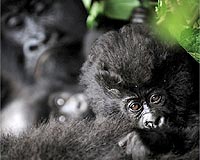| . |  |
. |
Evanston IL (SPX) May 12, 2010 How do children reason about the natural world? How do they understand the relation between human and non-human animals? For decades, the consensus was that as young children begin reasoning about the biological world, they adopt an "anthropocentric" stance, favoring humans over non-human animals when it comes to learning about properties of animals. But Northwestern University researchers have taken another look at the way children reason about biology. Research by Douglas Medin, Sandra Waxman and Jennie Woodring in the psychology department in the Weinberg College of Arts and Sciences and Karen Washinawatok of the Menominee Language and Culture Commission reveals that this style of human-centered reasoning is not universal. In a study, which appeared May 1 in the journal Cognitive Development, the Northwestern researchers teamed up with researchers and educators from the Menominee Nation in Wisconsin to determine whether this human-centered (or anthropocentric) reasoning is universal. They were interested in whether such reasoning is influenced by children's experience with the natural world and the culture and belief systems of their communities. To examine these potential influences, the study included children growing up in an urban setting (Chicago) as well as children from rural Wisconsin, who have more extensive direct contact with the natural world. To examine the influence of culture, the rural community included European-American and Native American (Menominee) children. The results were striking - while young urban children revealed a human-centered pattern of reasoning, the rural European-American and Native American children did not. Children's experience, including the extent of their day-to-day interactions with the natural world and their sensitivity to the belief systems of their communities, influences their reasoning about the natural world. For example, the researchers noted that while children generally are taught in school that only plants and animals are alive, the traditional Menominee notion of "alive" includes natural inanimates, such as rocks and water, and may even include artifacts, depending on the purpose for which they were made. Such cultural differences provide strong evidence that the human-centered pattern displayed by young urban children is not a universal starting point for development, as researchers and educators had previously assumed, said Waxman, a co-author and professor of psychology. "Instead, this human-centered style of reasoning is itself culturally inflected," said Waxman. "It may, in fact, reflect a cultural model that is prevalent in the media for young children, for example, stories and films in which animals talk, sing and act like humans."
Share This Article With Planet Earth
Related Links Northwestern University Darwin Today At TerraDaily.com
 Czech gorilla-mania helps animals in Cameroon
Czech gorilla-mania helps animals in CameroonPrague (AFP) May 10, 2010 Gorillas in Cameroon are finding an unlikely source of help - a wave of interest in the Czech Republic fed by a primate reality show and a zoo's fundraising drive using recycled mobile phones. The birth of a baby gorilla at Prague Zoo was broadcast live in April on an Internet radio show starring the animals, which has proved a huge hit among the Czech public since it was launched in 2007. ... read more |
|
| The content herein, unless otherwise known to be public domain, are Copyright 1995-2010 - SpaceDaily. AFP and UPI Wire Stories are copyright Agence France-Presse and United Press International. ESA Portal Reports are copyright European Space Agency. All NASA sourced material is public domain. Additional copyrights may apply in whole or part to other bona fide parties. Advertising does not imply endorsement,agreement or approval of any opinions, statements or information provided by SpaceDaily on any Web page published or hosted by SpaceDaily. Privacy Statement |